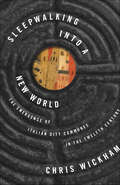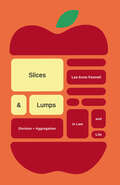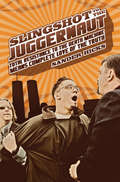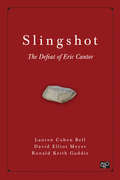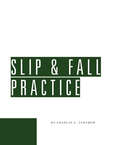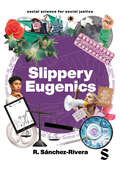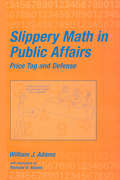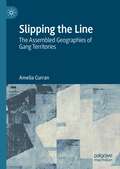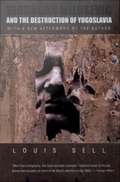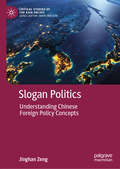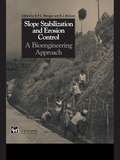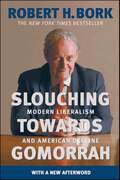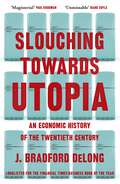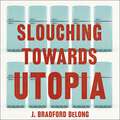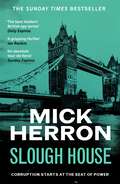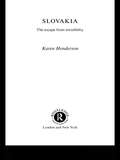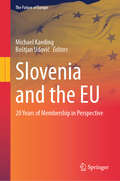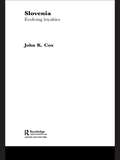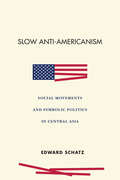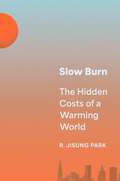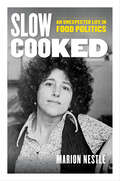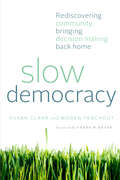- Table View
- List View
Sleepover School: Book 14 (Secret Princesses #14)
by Rosie BanksA magical series where best friends become Secret Princesses! This book is a special long length for even more magical fun. Best friends Charlotte and Mia can't bear it when Charlotte's family moves far away. But when they become trainee Secret Princesses they begin an amazing adventure together - and they can see each other whenever they like!Once in a blue moon, a tiara shaped constellation forms high in the sky above Wishing Star Palace. The four girls that make a wish on these special stars get their wishes granted by the Secret Princesses ... but Princess Poison is determined that this year the wishes won't come true ...Have you read all four books in series four: The Moonstone Collection?
Sleepwalking into a New World: The Emergence of Italian City Communes in the Twelfth Century (The Lawrence Stone Lectures)
by Chris WickhamA bold new history of the rise of the medieval Italian communeAmid the disintegration of the Kingdom of Italy in the eleventh and twelfth centuries, a new form of collective government—the commune—arose in the cities of northern and central Italy. Sleepwalking into a New World takes a bold new look at how these autonomous city-states came about, and fundamentally alters our understanding of one of the most important political and cultural innovations of the medieval world.Chris Wickham provides richly textured portraits of three cities—Milan, Pisa, and Rome—and sets them against a vibrant backcloth of other towns. He argues that, in all but a few cases, the elites of these cities and towns developed one of the first nonmonarchical forms of government in medieval Europe, unaware that they were creating something altogether new. Wickham makes clear that the Italian city commune was by no means a democracy in the modern sense, but that it was so novel that outsiders did not know what to make of it. He describes how, as the old order unraveled, the communes emerged, governed by consular elites "chosen by the people," and subject to neither emperor nor king. They regularly fought each other, yet they grew organized and confident enough to ally together to defeat Frederick Barbarossa, the German emperor, at the Battle of Legnano in 1176.Sleepwalking into a New World reveals how the development of the autonomous city-state took place, which would in the end make possible the robust civic culture of the Renaissance.
Slices & Lumps: Division and Aggregation in Law and Life
by Lee Anne FennellHow things are divided up or pieced together matters. Half a bridge is of no use at all. Conversely, many things would do more good if they could be divided up differently: Perhaps you would prefer a job that involves a third less work and a third less pay or a car that materializes only when needed and is priced accordingly? Difficulties in “slicing” and “lumping” shape nearly every facet of how we live and work—and a great deal of law and policy as well. Lee Anne Fennell explores how both types of challenges—carving out useful slices and assembling useful lumps—surface in myriad contexts, from hot button issues like conservation and eminent domain to developments in the sharing economy to personal struggles over work, money, time, diet, and exercise. Yet the significance of configuration is often overlooked, leading to missed opportunities for improving our lives. With a technology-fueled entrepreneurial explosion underway that is dividing goods, services, and jobs in novel ways, and as urbanization and environmental threats raise the stakes for assembling resources and cooperation, this is an especially exciting and crucial time to confront questions of slicing and lumping. The future of the city, the workplace, the marketplace, and the environment all turn on matters of configuration, as do the prospects for more effective legal doctrines, for better management of finances and health, and more. This book reveals configuration’s power and potential—as a unifying concept and as a focus of public and private innovation.
Slingshot to the Juggernaut: Total Resistance to the Death Machine Means Complete Love of the Truth
by Sander HicksIn the ten years since 9/11, a grassroots truth movement has sprung up that unites the best elements of the right and left. The call to resist the secrecy, imperialism, and the manipulation of the elite has been heard by a wide spectrum of people, across religious and political lines. This is a revolutionary moment that has lacked a clarifying manifesto.Until now.Pulling from his personal confrontations with the FBI, Rudolph Giuliani, Eliot Spitzer, and Dick Cheney, activist, maverick, and investigative reporter Sander Hicks reaches for a broader understanding of who was behind the 9/11 attacks. He reports the mysterious murder of Dr. David M. Graham, a Shreveport dentist who met two of the 9/11 hijackers but was then harassed by the FBI and poisoned. Scientific evidence leads him to take a hard, critical stance against Bush, Cheney, and the 9/11 "Official Story."Weaving evidence with anecdote, Slingshot to the Juggernaut is an inspiring ride into the 9/11 cover-up and the revolutionary possibilities it inadvertently created. Provocative and unyielding, Hicks examines the evidence, draws conclusions, and offers a vision for the future of the United States.
Slingshot: The Defeat of Eric Cantor
by Lauren Cohen Bell Ronald Keith Gaddie David Elliot MeyerIncumbents don't lose. So how did nationally prominent House Majority Leader Eric Cantor lose a primary battle to college professor David Brat, an unknown political rookie? In Slingshot: The Defeat of Eric Cantor, authors Lauren Cohen Bell, David Elliot Meyer and Ronald Keith Gaddie take advantage of exceptional behind-the-scenes access to the Brat campaign to explain the challenger’s victory. They examine the essential need for elected officials to maintain strong support in their home districts and just how Cantor’s focus on climbing the party ranks in Washington contributed to his loss. They also show how local “rules of the game” —particularly voter mobilization in this case—affect elections, and they explore the continuing impact of the Tea Party and its role in the factionalism of current Southern politics. “This is a book that needed to be written. Eric Cantor’s defeat was not only shocking but it runs against everything we teach in our election courses. By extracting the lessons from Cantor’s defeat, Slingshot helps to inform our more general understanding of campaigns & elections.” -Professor Kirby Goidel, Texas A&M University
Slingshot: The Defeat of Eric Cantor
by Lauren Cohen Bell Ronald Keith Gaddie David Elliot MeyerIncumbents don't lose. So how did nationally prominent House Majority Leader Eric Cantor lose a primary battle to college professor David Brat, an unknown political rookie? In Slingshot: The Defeat of Eric Cantor, authors Lauren Cohen Bell, David Elliot Meyer and Ronald Keith Gaddie take advantage of exceptional behind-the-scenes access to the Brat campaign to explain the challenger’s victory. They examine the essential need for elected officials to maintain strong support in their home districts and just how Cantor’s focus on climbing the party ranks in Washington contributed to his loss. They also show how local “rules of the game” —particularly voter mobilization in this case—affect elections, and they explore the continuing impact of the Tea Party and its role in the factionalism of current Southern politics. “This is a book that needed to be written. Eric Cantor’s defeat was not only shocking but it runs against everything we teach in our election courses. By extracting the lessons from Cantor’s defeat, Slingshot helps to inform our more general understanding of campaigns & elections.” -Professor Kirby Goidel, Texas A&M University
Slip & Fall Practice
by Charles TurnbowPlaintiffs' attorneys lose 40% of their slip and fall cases. Failure to prove a causative link between the hazard and a negligent act of the defendant is the number one reason for these high losses. Charles Turnbow, attorney-engineering consultant on over 9,500 slip and fall cases, shows you how to prove causation (and how to efficiently screen out cases lacking it) in his highly-respected toolbook, Slip & Fall Practice: * Analyzing the mechanics of the fall to identify the cause * The most common cases and what they must have to win * Documenting the dangerous condition and the negligence that caused it * Establishing the duty of care * Proving control of the premises * Establishing actual or constructive notice * Showing that the hazard caused the injury Slip & Fall Practice is loaded with case evaluation strategies, illustrative fact patterns (with photos), discovery forms, expert witness checklists, case authorities, building code citations, model pleadings, trial preparation aids, and most important, timesaving and case-winning practice tips.
Slippery Eugenics: An Introduction to the Critical Studies of Race, Gender and Coloniality (Social Science for Social Justice)
by R. Sánchez-RiveraDiscover the hidden legacy of eugenics and its enduring influence on modern policies and global society. Beginning with the origins of eugenics, Sánchez-Rivera traces the spread of eugenic ideas across different nations, revealing how they intersect with nationalism, populism and individual reproductive rights. Through a comprehensive exploration, this book uncovers how these intertwined legacies still shape our world today offering fresh insights into the subtle forces that define contemporary social and political landscapes, and have lasting impacts on reproductive control, racialization, colonialism, gender norms, and more. The Social Science for Social Justice series challenges the Ivory Tower of academia, providing a platform for academics, journalists, and activists of color to respond to pressing social issues.
Slippery Eugenics: An Introduction to the Critical Studies of Race, Gender and Coloniality (Social Science for Social Justice)
by R. Sánchez-RiveraDiscover the hidden legacy of eugenics and its enduring influence on modern policies and global society. Beginning with the origins of eugenics, Sánchez-Rivera traces the spread of eugenic ideas across different nations, revealing how they intersect with nationalism, populism and individual reproductive rights. Through a comprehensive exploration, this book uncovers how these intertwined legacies still shape our world today offering fresh insights into the subtle forces that define contemporary social and political landscapes, and have lasting impacts on reproductive control, racialization, colonialism, gender norms, and more. The Social Science for Social Justice series challenges the Ivory Tower of academia, providing a platform for academics, journalists, and activists of color to respond to pressing social issues.
Slippery Math In Public Affairs: Price Tag And Defense
by William J. AdamsHighlighting how slippery numbers and questionable mathematical conclusions emerge and what can be done to safeguard against them, this book examines flawed usage of math in public affairs through actual cases of how mathematical data and conclusions can be distorted and misrepresented to influence public opinion. The author analyzes the cost of "s
Slipping the Line: The Assembled Geographies of Gang Territories
by Amelia CurranThis book brings a new spatial analysis to gang territories through the concept of the gang assemblage- the variety of actors, contexts, and practices that create and maintain these spaces. This conceptualization helps overcome the tendency of gang literature to succumb to the gang territorial trap, the tendency to assume gang territories are fixed and static containers of gang life. Drawing on multi-sited qualitative fieldwork in central Canada, interviews with gang and non-gang-affiliated residents, police, and administrators show gang territories being made material through a wide variety of daily embodied practices. Recognizing the role of multiple actors encourages a relational ethics of accountability between bodies, practices, and place that challenges the often-naturalized connections between race, space, and crime. Understanding gang space as enacted through embodied material practices provides an alternative way to think through, trace, and disrupt these associations.
Slobodan Milosevic
by Louis SellIn Slobodan Milosevic and the Destruction of Yugoslavia former U. S. foreign service officer Louis Sell fills a gap in the literature on the Yugoslav conflicts by covering both the domestic Yugoslav side of the collapse and the history and consequences of international interventions in the wars in Slovenia and Croatia in 1991, Bosnia in 1992-1995, and Kosovo from 1998-1999. Sell focuses on the life and career of Milosevic, from the perspective of both a diplomatic insider intimately familiar with the region and a scholar who has researched all the available English and Serbo-Croatian sources. Sell spent much of his diplomatic career in Eastern Europe and Russia, including eight years in Yugoslavia between 1974 and 2000, and witnessed the events that contributed to the dissolution and ultimate destruction of Yugoslavia. In Slobodan Milosevic and the Destruction of Yugoslavia he provides first-hand observations of Milosevic from the heady days of his rise to power and, later, in the endgame of the Bosnian war, including the Dayton Peace Conference. Drawing on a wide range of published material as well as interviews with Yugoslav and foreign participants, Sell covers such areas as Milosevic's relationship to the military, his responsibility for war crimes, his methods of persuasion and negotiation, and his notoriously explosive personality.
Slogan Politics: Understanding Chinese Foreign Policy Concepts (Critical Studies of the Asia-Pacific)
by Jinghan ZengThis book studies the three most important Chinese foreign policy concepts under Xi Jinping’s leadership – “New Type of Great Power Relations”, “Belt and Road Initiative” and “Community of Shared Future for Mankind”. Those signature concepts are often considered as China’s well-thought-out strategic plans reflecting Beijing’s concrete geopolitical vision. This book, however, argues that these views are mistaken. It develops a slogan politics approach to study Chinese foreign policy concepts. The overarching argument is that those concepts should be understood as multifunctional slogans for political communication on the domestic and international stages. This book shows how those concepts function as political slogans to (1) declare intent, (2) assert power and test domestic and international support, (3) promote state propaganda, and (4) call for intellectual support. The slogan politics approach highlights the critical role of China’s academic and local actors as well as international actors in shaping China’s foreign policy ideas. It provides critical insights to understand how Chinese domestic actors exert their influence and voice their narratives to influence China’s policy agenda and debate. It suggests that the existing analyses vastly exaggerate Beijing’s capacity to coordinate domestic actors including forging coherent Chinese foreign policy narratives and unifying use of China’s policy concepts.
Slope Stabilization and Erosion Control: A Bioengineering Approach
by Roy P.C. Morgan R.J. RicksonThis book is an up-to-date review of research and practice on the use of vegetation for slope stabilization and control of surface erosion caused by water and wind. From a basic understanding of the principles and practices of vegetation growth and establishment, it describes how vegetation can be treated as an engineering material and used to solve erosion and slope stability problems.
Slouching Towards Gomorrah: Modern Liberalism and American Decline
by Robert H. BorkIn this New York Times bestselling book, Robert H. Bork, our country's most distinguished conservative scholar, offers a prophetic and unprecedented view of a culture in decline, a nation in such serious moral trouble that its very foundation is crumbling: a nation that slouches not towards the Bethlehem envisioned by the poet Yeats in 1919, but towards Gomorrah.Slouching Towards Gomorrah is a penetrating, devastatingly insightful exposé of a country in crisis at the end of the millennium, where the rise of modern liberalism, which stresses the dual forces of radical egalitarianism (the equality of outcomes rather than opportunities) and radical individualism (the drastic reduction of limits to personal gratification), has undermined our culture, our intellect, and our morality.In a new Afterword, the author highlights recent disturbing trends in our laws and society, with special attention to matters of sex and censorship, race relations, and the relentless erosion of American moral values. The alarm he sounds is more sobering than ever: we can accept our fate and try to insulate ourselves from the effects of a degenerating culture, or we can choose to halt the beast, to oppose modern liberalism in every arena. The will to resist, he warns, remains our only hope.
Slouching Towards Utopia: An Economic History of the Twentieth Century
by Brad de LongLONGLISTED FOR THE FINANCIAL TIMES BUSINESS BOOK OF THE YEAR AWARD 2022From one of the world's leading economists, a sweeping new history of the twentieth century - a century that left us vastly richer, yet still profoundly dissatisfied.Before 1870, most people lived in dire poverty, the benefits of the slow crawl of invention continually offset by a growing population. Then came a great shift: invention sprinted forward, doubling our technological capabilities each generation, and creatively destroying the economy again and again. Slouching Towards Utopia tells the story of the major economic and technological shifts of the 20th century in a bold and ambitious, grand narrative. In vivid and compelling detail, DeLong charts the unprecedented explosion of material wealth after 1870 which transformed living standards around the world, freeing humanity from centuries of poverty, but paradoxically has left us now with unprecedented inequality, global warming, and widespread dissatisfaction with the status quo. How did the long twentieth century fail to deliver the utopia our ancestors believed would be the inevitable result of such material wellbeing? How did humanity end up less on a march to progress than a slouch in the right direction? And what can we learn from the past in pursuit of a better world?
Slouching Towards Utopia: An Economic History of the Twentieth Century
by Brad de LongFrom one of the world's leading economists, a sweeping new history of the twentieth century - a century that left us vastly richer, yet still profoundly dissatisfied.Before 1870, most people lived in dire poverty, the benefits of the slow crawl of invention continually offset by a growing population. Then came a great shift: invention sprinted forward, doubling our technological capabilities each generation, and creatively destroying the economy again and again. Slouching Towards Utopia tells the story of the major economic and technological shifts of the 20th century in a bold and ambitious, grand narrative. In vivid and compelling detail, DeLong charts the unprecedented explosion of material wealth after 1870 which transformed living standards around the world, freeing humanity from centuries of poverty, but paradoxically has left us now with unprecedented inequality, global warming, and widespread dissatisfaction with the status quo. How did the long twentieth century fail to deliver the utopia our ancestors believed would be the inevitable result of such material wellbeing? How did humanity end up less on a march to progress than a slouch in the right direction? And what can we learn from the past in pursuit of a better world?(P) 2022 Hachette Audio
Slough House: The bestselling thrillers that inspired the hit Apple TV+ show Slow Horses (Slough House Thriller 7) (Slough House Thriller #7)
by Mick Herron*Pre-order Clown Town, the ninth novel in Mick Herron's Slough House series, now**Now an award-winning Apple TV+ series starring Gary Oldman, Kristin Scott Thomas and Jack Lowden**THE INSTANT SUNDAY TIMES BESTSELLER****WINNER OF THE THEAKSTON OLD PECULIER CRIME NOVEL OF THE YEAR 2022***'A gripping thriller' Ian Rankin****Slough House - the crumbling office building to which failed spies, the 'slow horses', are banished - has been wiped from secret service records.Reeling from recent losses in their ranks, the slow horses are worried they've been pushed further into the cold, and fatal accidents keep happening.With a new populist movement taking a grip on London's streets, the aftermath of a blunder by the Russian secret service that left a British citizen dead, and the old order ensuring that everything's for sale to the highest bidder, the world's an uncomfortable place for those deemed surplus to requirements. The wise move would be to find a safe place and wait for the troubles to pass.But the slow horses aren't famed for making wise decisions.'The most completely realised espionage universe since that peopled by George Smiley' The Times'An absolute tour-de-force' Sunday Express
Slovakia: The Escape from Invisibility (Postcommunist States and Nations)
by Karen HendersonSince Slovakia achieved independent statehood at the end of 1992 it has become one of the most prosperous post-communist states. This book provides a unique and thorough introduction to Slovakia and will enable the reader to understand its multi-faceted nature. The book includes chapters on Twentieth Century History, Politics, Economy and International Relations.
Slovenia and the EU: 20 Years of Membership in Perspective (The Future of Europe)
by Michael Kaeding Boštjan UdovičThis book addresses a range of aspects essential to a better understanding of Slovenia's 20 years in the EU and its exposure to the European integration process, including changes to its policies on e.g. competitiveness, industry, innovation, foreign policy and diplomacy, security and defense, but also its relations to neighboring countries, its experience with European elections, and different forms of Euroscepticism and citizens' trust in EU institutions. Subsequent chapters explore how Slovenia has been coping with the Maastricht criteria and EU law more generally in its polities and politics, benefitting from EU funds, and defending its language as an official language of the EU. In concise contributions, the authors – with diverse scholarly backgrounds and hailing from Slovenia and abroad – assess these aspects and share their perspectives on Slovenia's experiences after 20 years of full EU membership.
Slovenia: Evolving Loyalties (Postcommunist States and Nations #Vol. 18)
by John K. CoxA clear and concise introduction to contemporary Slovenia. It examines the country's rapid transition from a collection of provinces in the southern part of the Habsburg Empire, to a republic within Yugoslavia, to an independent state and analyzes the major political and economic developments since 1991. The perfect introduction to one of Europe's most fascinating nations.
Slow Anti-Americanism: Social Movements and Symbolic Politics in Central Asia
by Edward SchatzNegative views of the United States abound, but we know too little about how such views affect politics. Drawing on careful research on post-Soviet Central Asia, Edward Schatz argues that anti-Americanism is best seen not as a rising tide that swamps or as a conflagration that overwhelms. Rather, "America" is a symbolic resource that resides quietly in the mundane but always has potential value for social and political mobilizers. Using a wide range of evidence and a novel analytic framework, Schatz considers how Islamist movements, human rights activists, and labor mobilizers across Central Asia avail themselves of this fact, thus changing their ability to pursue their respective agendas. By refocusing our analytic gaze away from high politics, he affords us a clearer view of the slower-moving, partially occluded, and socially embedded processes that ground how "America" becomes political. In turn, we gain a nuanced appreciation of the downstream effects of US foreign policy choices and a sober sense of the challenges posed by the politics of traveling images. Most treatments of anti-Americanism focus on politics in the realm of presidential elections and foreign policies. By focusing instead on symbols, Schatz lays bare how changing public attitudes shift social relations in politically significant ways, and considers how changing symbolic depictions of the United States recombine the raw material available for social mobilizers. Just like sediment traveling along waterways before reaching its final destination, the raw material that constitutes symbolic America can travel among various social groups, and can settle into place to form the basis of new social meanings. Symbolic America, Schatz shows us, matters for politics in Central Asia and beyond.
Slow Burn: The Hidden Costs of a Warming World
by R. Jisung ParkHow the subtle but significant consequences of a hotter planet have already begun—from lower test scores to higher crime rates—and how we might tackle them todayIt&’s hard not to feel anxious about the problem of climate change, especially if we think of it as an impending planetary catastrophe. In Slow Burn, R. Jisung Park encourages us to view climate change through a different lens: one that focuses less on the possibility of mass climate extinction in a theoretical future, and more on the everyday implications of climate change here and now.Drawing on a wealth of new data and cutting-edge economics, Park shows how climate change headlines often miss some of the most important costs. When wildfires blaze, what happens to people downwind of the smoke? When natural disasters destroy buildings and bridges, what happens to educational outcomes? Park explains how climate change operates as the silent accumulation of a thousand tiny conflagrations: imperceptibly elevated health risks spread across billions of people; pennies off the dollar of productivity; fewer opportunities for upward mobility.By investigating how the physical phenomenon of climate change interacts with social and economic institutions, Park illustrates how climate change already affects everyone, and may act as an amplifier of inequality. Wealthier households and corporations may adapt quickly, but, without targeted interventions, less advantaged communities may not.Viewing climate change as a slow and unequal burn comes with an important silver lining. It puts dollars and cents behind the case for aggressive emissions cuts and helps identify concrete steps that can be taken to better manage its adverse effects. We can begin to overcome our climate anxiety, Park shows us, when we begin to tackle these problems locally.
Slow Cooked: An Unexpected Life in Food Politics (California Studies in Food and Culture #78)
by Marion NestleMarion Nestle reflects on her late-in-life career as a world-renowned food politics expert, public health advocate, and a founder of the field of food studies after facing decades of low expectations. In this engrossing memoir, Marion Nestle reflects on how she achieved late-in-life success as a leading advocate for healthier and more sustainable diets. Slow Cooked recounts of how she built an unparalleled career at a time when few women worked in the sciences, and how she came to recognize and reveal the enormous influence of the food industry on our dietary choices. By the time Nestle obtained her doctorate in molecular biology, she had been married since the age of nineteen, dropped out of college, worked as a lab technician, divorced, and become a stay-at-home mom with two children. That's when she got started. Slow Cooked charts her astonishing rise from bench scientist to the pinnacles of academia, as she overcame the barriers and biases facing women of her generation and found her life's purpose after age fifty. Slow Cooked tells her personal story—one that is deeply relevant to everyone who eats, and anyone who thinks it's too late to follow a passion.
Slow Democracy: Rediscovering Community, Bringing Decision Making Back Home
by Susan Clark Woden TeachoutReconnecting with the sources of decisions that affect us, and with the processes of democracy itself, is at the heart of 21st-century sustainable communities.Slow Democracy chronicles the ways in which ordinary people have mobilized to find local solutions to local problems. It invites us to bring the advantages of "slow" to our community decision making. Just as slow food encourages chefs and eaters to become more intimately involved with the production of local food, slow democracy encourages us to govern ourselves locally with processes that are inclusive, deliberative, and citizen powered.Susan Clark and Woden Teachout outline the qualities of real, local decision making and show us the range of ways that communities are breathing new life into participatory democracy around the country. We meet residents who seize back control of their municipal water systems from global corporations, parents who find unique solutions to seemingly divisive school-redistricting issues, and a host of other citizens across the nation who have designed local decision-making systems to solve the problems unique to their area in ways that work best for their communities.Though rooted in the direct participation that defined our nation's early days, slow democracy is not a romantic vision for reigniting the ways of old. Rather, the strategies outlined here are uniquely suited to 21st-century technologies and culture.If our future holds an increased focus on local food, local energy, and local economy, then surely we will need to improve our skills at local governance as well.

